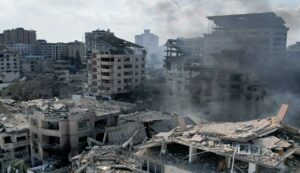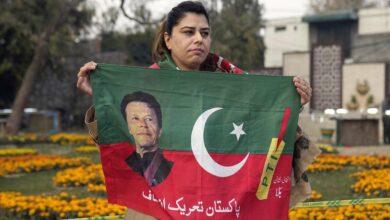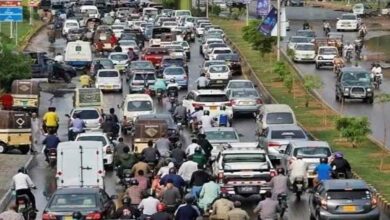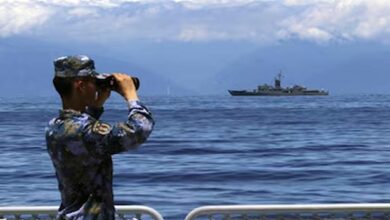United States warns Israel against Gaza-like military action in Lebanon

The remarks followed the much-awaited phone conversation between US President Joe Biden and Israeli Prime Minister Benjamin Netanyahu, which was their first in seven weeks and was predicted to center on Israel’s reaction to Iran’s missile bombardment last week.
According to the White House, Biden instructed Netanyahu to “minimize harm” to people in Lebanon during the conversation, especially in “densely populated areas of Beirut.”
Journalists were warned by State Department spokesperson Matthew Miller that “there should be no kind of military action in Lebanon that looks anything like Gaza and leaves a result anything like Gaza.”
In a video speech to the Lebanese people on Tuesday, Netanyahu stated: “You have an opportunity to save Lebanon before it falls into the abyss of a long war that will lead to destruction and suffering like we see in Gaza.”
He concluded by saying, “Free your country from Hezbollah so that this war can end.”
THE “DEADLY, PRECISE” RETURN
It was anticipated that the topic of Biden and Netanyahu’s conversation would be Israel’s reaction to Iran’s missile assault from last week.
Iran announced that it was retaliating for the deaths of Hamas leader Ismail Haniyeh and Hezbollah leader Hassan Nasrallah by firing over 200 missiles toward Israel. The majority were intercepted by Israel’s air defenses or by partner air forces.
Biden has warned Israel against trying to attack Iran’s nuclear program, which would likely result in severe retribution, and against hitting the nation’s oil infrastructure, which would cause a sharp increase in the price of crude oil globally.
Hezbollah agreed a truce with Israel on September 27, the day an Israeli attack killed Hassan Nasrallah, the head of the terrorist organization supported by Iran, a Lebanese government source told AFP.
The Lebanese government, they said, “had no contact with Hezbollah” since his passing, and Israel’s retaliation had ruined the ceasefire agreement, which was supported by Washington and its allies.
According to Yoav Gallant, Israel’s minister of defense, “our attack on Iran will be deadly, precise, and surprising.”
ROCK HEZBOLLAH AND ISRAELI STRIKES
Hezbollah said that its soldiers were engaged in combat with Israeli forces in southern Lebanon, rebuffing efforts to cross the border with rocket-propelled weaponry.
According to authorities, two missiles launched at the seaside town of Caesarea were intercepted by Israeli air defenses, while two people were killed by suspected Hezbollah rocket fire in the northern Israeli town of Kiryat Shmona.
According to Lebanon’s health ministry, an Israeli hit on a town in the Shouf district, southeast of Beirut, resulted in the deaths of at least four individuals. Up until now, this area had been mostly spared by Israel’s increased bombing campaign.
Subsequently, the official civil defense authority of Lebanon said that five of its staff were killed in an Israeli attack in the southern hamlet of Derdghaiya.
Over a million people have fled as a result of Israel’s increased airstrikes on Hezbollah strongholds in Lebanon since September 23, according to an AFP count of government numbers.
On September 30, its ground troops entered Lebanon in retaliation for Hezbollah artillery and rocket strikes that had driven tens of thousands of Israelis from their homes in border towns throughout the previous year.
Over the course of the previous day, Israel’s military said on Wednesday that its forces had “eliminated terrorists during close-quarter encounters and in aerial strikes” and that “100 Hezbollah terror targets were destroyed”.
Israeli activities now include the southern portion of Lebanon’s Mediterranean coast in addition to border territories in the interior.
Since the start of military operations inside Lebanon, 13 Israeli troops have lost their lives, according to a revised toll released by the army on Wednesday.
Following an Israeli raid that day on the country’s south, Syrian state media claimed an Israeli attack early on Thursday on the central provinces of Homs and Hama.
Adham Jahout, a member of Hezbollah, was killed in Syria, the Israeli air force said on Wednesday.
TRAPPED CIVILIANS IN NORTH GAZA
The United Nations agency for Palestinian refugees (UNRWA) chief, Philippe Lazzarini, estimates that about 400,000 Palestinians are trapped in the area of Jabalia in northern Gaza, where Israel has extended an ongoing military campaign.
In a post on the social networking site X, Lazzarini said that the region has “no end to hell” and that “recent evacuation orders from the Israeli authorities are forcing people to flee again & again”.
The Palestinian territory’s civil defense service stated that the army had shelled the town of Jabalia and its refugee camp on Wednesday, delaying the delivery of assistance after encircling it over the weekend.
As Israel continues to tighten its grip on Gaza, Washington said that it was “incredibly concerned” about the humanitarian situation there and added that it has been “the subject of some very urgent discussions between our two governments”.
“We have been making clear to the government of Israel that they have an obligation under international humanitarian law to allow food and water and other needed humanitarian assistance to make it into all parts of Gaza,” Miller, a spokesperson for the State Department, told media.
At least 42,010 Palestinians have died in Gaza as a result of Israel’s retaliatory operation, according to numbers from the health ministry of the Hamas-run enclave that the UN has deemed credible.
LOCATED IN BEIRUT
According to Israeli police, a stabbing spree at four different places in the central Israeli town of Hadera on Wednesday left at least six people injured, several of them critically.
At least four Palestinians were murdered by Israeli border police in the northern city of Nablus in the occupied West Bank, according to Israeli security forces and Palestinian health officials.
Thousands of displaced families were seen on Beirut’s waterfront on Wednesday, after Israeli air strikes, and many residents in the city are sleeping outside on the streets.
Ahmad, a 77-year-old Beirut man who expressed concern for retaliation by not disclosing his family name, said he had a message for Hezbollah.
Declare that you are losing and that you are retreating if you are unable to fight on. “Losing is not a source of shame,” he said.
However, a guy from the south of the nation named Raed Ayyash expressed his optimism that Hezbollah will continue to fight.
“We hope for victory, and we will never give up,” he said.





